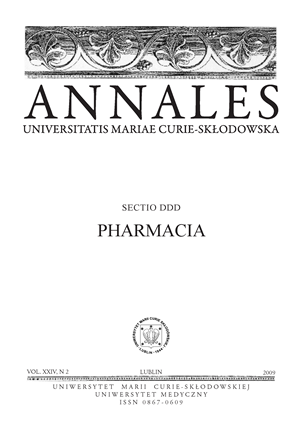Synteza pochodnych 7-arylosulfonylo-3,5 (2H)-dioxo-6,7-dihydroimidazo[2,1-c] triazolu. Część II
DOI:
https://doi.org/10.2478/v10080-008-0178-7Abstrakt
Otrzymano szereg pochodnych 7 arylosulfonylo-3,5(2H)-diokso-6,7-dihydroimidazo [2,1-c][1,2,4] triazolu w wyniku kondensacji 1-arylosulfonylo-2-hydrazynoimidazolidyno-4-onów z karbonylodiimidazolem. Na podstawie budowy pochodnych imidazotriazolu należy spodziewać
się, że związki te powinny wykazywać działanie przeciwgrzybicze.
Bibliografia
1. Rządkowska M., Sztanke K.: Synthesis of new derivatives of 7-arylsulfony-3 (2H)-oxo, thioxo, imino-5-oxo-6,7-dihydroimidazo [2,1-c][1,2,4] triazole. Annales UMCS, Sect. DDD, 15, 21, 2002.
2. Schiro k H., Mittendor f J. et al.: Preparation of imidazo [2,1-c][1,2,4] triazoles as guanylate cyclase activators for treatment of cardiovascular diseases.: WO, 2008, 061657.
3. Singh H., Shukla K. N. et al: Synthesis of some new heterocyclic compounds containing bridgehead nitrogen atom as antifungal drugs. Indian J. Pharm. Sci., 52, 9, 1990.
4. Sztanke K., Pasternak K. et al.: Synthesis of imidazoline and imidazo[2,1-c][1,2,4] triazole aryl derivatives containing the methy i thio group as possible antibacterial agents. Bioorganic & Medicinal Chemistry, 14, 11, 2006.
5. Sztank e K., Rządkowska M.: Synthesis of new 3-unsubstituted and 3-substituted derivatives of 7-aryl-5H-6,7-dihydroimidazo [2,1-c][1,2,4] triazole.: Annales UMCS, Sect. DDD, 2003, 16, 21.
6. Wannamaker M., Salitur o F. et al.: Compounds useful as inhibitors of janus kinases. WO, 2008, 116139.
Pobrania
Opublikowane
Numer
Dział
Licencja
Prawa autorskie (c) 2009 Autorzy

Praca jest udostępniana na licencji Creative Commons Attribution-NonCommercial-NoDerivatives 3.0 Unported License.


